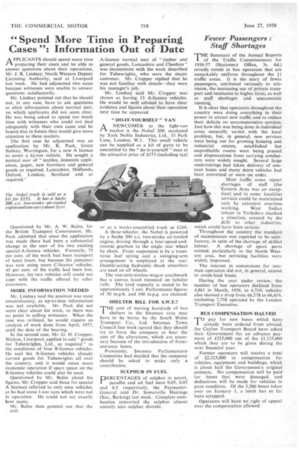"Spend More Time in Preparing Cases ": Information Out of Date
Page 54

If you've noticed an error in this article please click here to report it so we can fix it.
APPLICANTS should spend more time preparing their cases and be able to answer questions about their operations, Mr. J. R. Lindsay, North Western Deputy Licensing Authority, said at Liverpool last week. He had adjourned two cases because witnesses were unable to answer questions satisfactorily.
Mr. Lindsay pointed out that he should not, in any ease, have to ask questions to elicit information about normal user, on which applicants did not seem clear. He was being asked to spend too much time with witnesses who could not deal adequately with their own cases and he hoped that in future they would give more attention to these matters.
The first case he adjourned was an application by Mr, K. Pack, Great Sankey, Warrington, for a new A licence to cover a 6i-ton vehicle. He sought a normal user of "textiles, domestic appliances, paper, new furniture and general goods as required, Lancashire, Midlands, Oxford, London, Scotland and as required."
Questioned by Mr. A. W. Balne, for the British Transport Commission, Mr. Pack admitted that since the application. was made there had been a substantial change in the user of his two existing special-A-licence vehicles. Formerly, 75 per cent, of the work had been transport of latex foam, but because his customer was now using More C=licence vehicles. 45 per cent, of the traffic had been lost. However, his two vehicles still could not cope with the traffic offered by other customers.
MORE INFORMATION NEEDED
Mr. Lindsay said the position was most -unsatisfactory, as up-to-date information was not available. Mr. Pack did not seem clear about his work, so there was no point in calling witnesses. When the case was re-listed, he would require an analysis of work done from April, 1957, until the date of the hearing.
In the second case, Mr. G. H. Cropper, Walton, Liverpool, applied to add "goods for Tubewrights, Ltd., as required" to the conditions of four B-licence vehicles. He said his A-licence vehicles already carried goods for Tubewrights all over the country, and it would mean more economic operation if spare space on the B-licence vehicles could also be used.
Questioned by Mr. Balne about his figures, Mr. Cropper said those for special A licences referred to only nine vehicles, as he had some 1-ton vans which were not in operation. He could not say exactly how many.
Mr. Babe then pointed out that the DI 0 A-licence normal user of "timber and general goods, Lancashire and Cheshire" was inconsistent with the work described for Tubewrights, who were the major customer. Mr. Cropper replied that he was not familiar with details—they were his manager's job.
Mr. Lindsay said Mr. Cropper was shown as having 13 A-licence vehicles. He would be well advised to have clear evidence and figures about their operation next time he appeared.
" DO-IT-YOURSELF " VAN
PAA NEWCOMER to the light-van market is the Nober 200, marketed by York Noble Industries, Ltd., 33 Park Lane, London, W.1. This small vehicle can be supplied as a kit of parts to be assembled by the " do-it-yourself " man at the attractive price of £153 (including tax) or as a works-assembled •truck at 1269.
A three-wheeler, the Nobel is powered by a Sachs 200 cc, two-stroke air-'cooled engine, driving through a four-speed-andreverse gearbox to the single rear wheel by chain. Front suspension is by a transverse leaf spring and a swinging-arm arrangement is employed at the rear. Double-acting hydraulic shock absorbers are used on all wheels.
The van-cum-station-wagon coachwork has a canvas hood mounted on tubular rails. The load capacity is stated to be approximately 5 cwt. Performance figures of 50 m.p.h. and 100 m.p.g. are claimed.
SHELTER BILL FOR S.W.T.?
THE cost of moving hundreds of bus 1. shelters in the Swansea area may have to be borne by the South Wales Transport Co.. Ltd. Swansea Town Council last week agreed that they should try to force the company to bear the cost of the alterations, which are necessary because of the introduction of frontentrance buses.
Previously, Swansea Parliamentary Committee had decided that the company should be asked to make only a contribution.
SULPHUR IN FUEL
PERCENTAGES of sulphur in petrol, paraffin and oil fuel were 0.05, 0.05 and 0.5 respectively, the PaymasterGeneral told Dr. Somerville Hastings (Soc.. Barking) last week. Complete combustion converted the sulphur almost entirely into sulphur dioxide.








































































































































